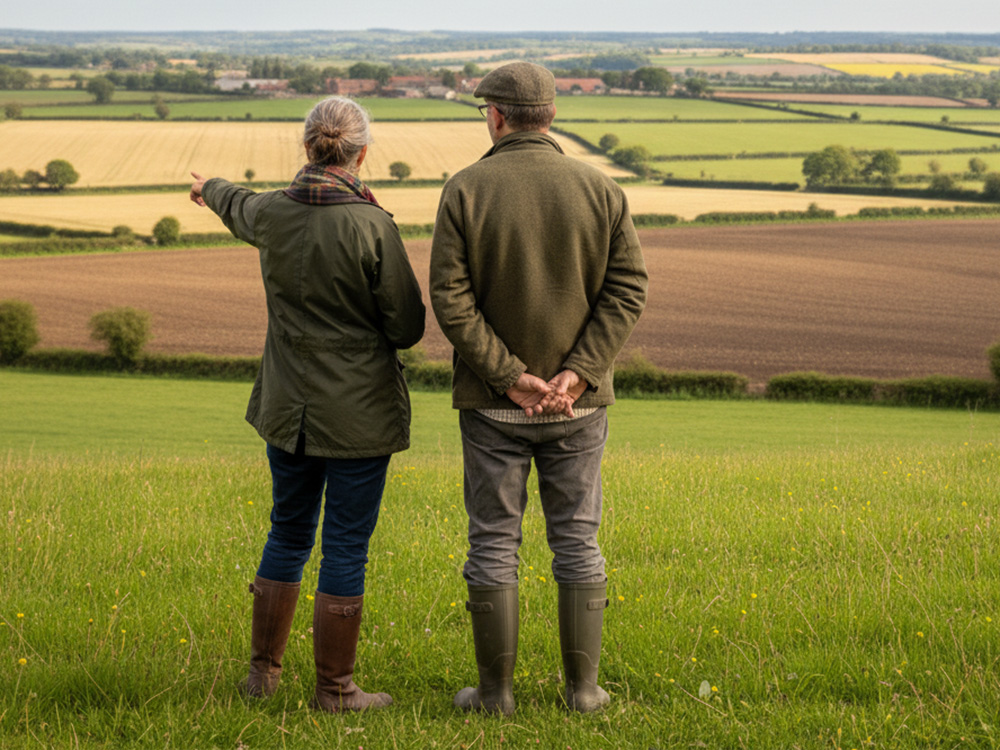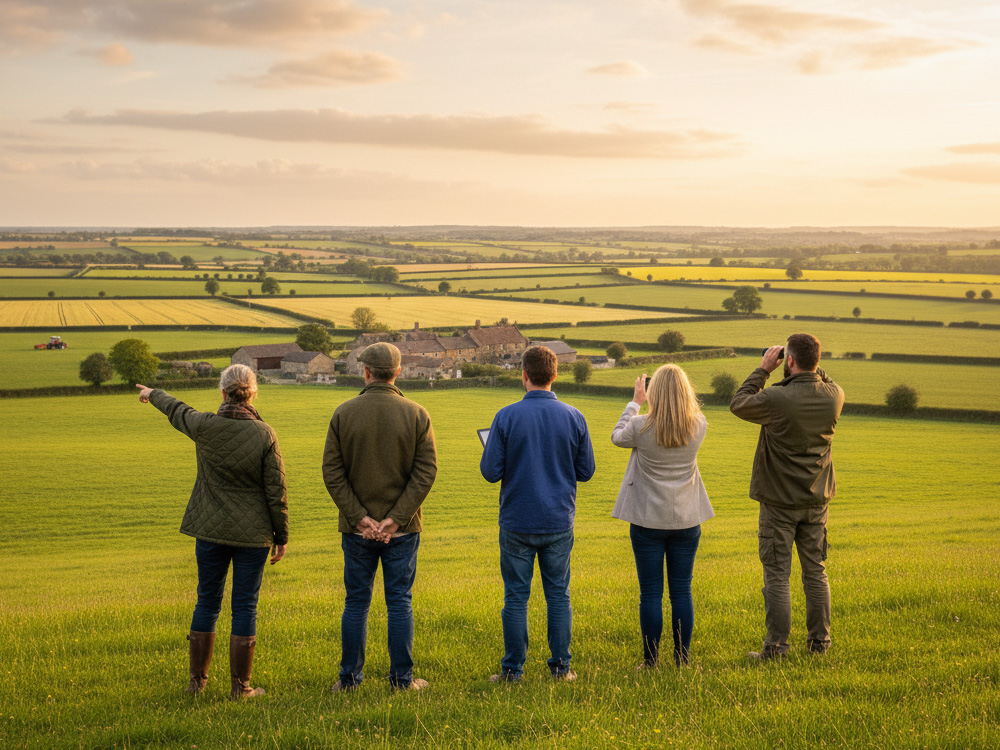Agricultural land has become one of the most talked-about alternative investments of the past decade. In uncertain financial markets, investors are increasingly asking: is agricultural land a good investment? For some, buying farmland as an investment has delivered steady appreciation, diversification, and tax advantages. For others, it has tied up capital in illiquid assets that underperform.
The truth is this: farmland is not a guaranteed win. But with the right strategy, the right timing, and the right insight, agricultural land can deliver outsized returns that rival or exceed traditional property or financial assets.
At Intelligent Land, we specialise in transforming land from a static holding into a growth engine, using our proprietary Land Value Accelerator™ (LVA Method™) to unlock hidden millions that others miss.
This guide provides a comprehensive look at agricultural land investment: the opportunities, the risks, the investor fears, and the solutions. If you are wondering is buying farm land a good investment?
Why Agricultural Land Can be a Good Investment
Investors are drawn to farmland for reasons that go far beyond nostalgia. Here’s why agricultural land investment remains compelling:
- Capital Growth – Farmland values in the UK have risen significantly over the last 50 years. While short-term cycles exist, long-term scarcity drives appreciation. Land cannot be manufactured, and demand continues to rise.
- Diversification – Farmland provides a hedge against volatile stock and bond markets. It often performs well when traditional assets falter.
- Tangible Asset – Unlike financial instruments, land is physical, usable, and enduring. It carries intrinsic value beyond balance sheets.
- Inflation Hedge – Historically, land prices have grown faster than inflation, protecting investor purchasing power.
- Tax Efficiency – Agricultural Property Relief (APR) can exempt farmland from inheritance tax, making it attractive for intergenerational wealth transfer.
- Resilience – As global food security becomes a priority, farmland is viewed as a safe haven asset.
But these benefits are the starting point, not the destination. The real potential in agricultural land a good investment lies in unlocking hidden agricultural land value through planning, diversification, and intelligent strategy.
Investor Fears (and Intelligent Land’s Solutions)
Buying agricultural land with the hope of it becoming a good investment is not without its doubts. Every investor considering buying farm land asks some version of the same questions. Below we’ve laid those questions out and the potential fear that drives them, then given our expert insight in response.
1. Will I be stuck with dead capital?
Fear: Land ties up funds without generating cashflow.
Insight: Passive ownership risks stagnation, but farmland offers numerous income models. Leasing to farmers, renewable energy projects (solar, wind, battery storage), biodiversity credits, carbon offsetting, equestrian businesses, and rural tourism (e.g., glamping) all create yield. Intelligent Land identifies the best-fit revenue models tailored to your parcel.
2. What about planning “red tape”?
Fear: Permissions are impossible to secure, and land without planning is worthless.
Insight: Most investors underestimate planning potential. The LVA Method™ reviews permissions, researches and examines any constraints, and runs AI-driven scenario testing to reveal overlooked routes.
In many cases, we uncover £1m+ uplifts within 24 hours.
3. What happens if policy changes?
Fear: Shifting subsidies or ESG rules could erode returns.
Insight: Policy change is inevitable. The opportunity lies in anticipating it. Our AI continuously tracks BNG, ELMS (Environmental Land Management Schemes), and net zero legislation to future-proof investment strategies.

4. Am I overpaying for agricultural land?
Fear: Land values vary wildly — am I buying at the peak?
Insight: Valuation must consider not just today’s agricultural value, but tomorrow’s planning and diversification potential. LVA benchmarks purchases against uplift opportunities, preventing costly mistakes.
5. Can small investors compete with big institutions?
Fear: Corporates and funds buy the best land, leaving little room for individuals.
Insight: Intelligent Land specialises in identifying overlooked opportunities — edge-of-settlement sites, underutilised smallholdings, or fragmented parcels where competition is limited.
6. How do I generate cashflow?
Fear: Farming returns alone are too low.
Insight: Farming income is only one layer. Intelligent Land helps investors unlock alternative income – from biodiversity net gain credits to carbon sequestration, from renewable energy leasing to rural enterprise uses.
7. What about tax and legal traps?
Fear: Complex rules around APR, inheritance tax, and ownership structures could backfire.
Insight: Legal and tax strategy is embedded into our research stage. We highlight opportunities for efficiency and ensure ownership structures support long-term goals.
Where Returns Really Come From
A successful agricultural land investment doesn’t rely solely on buying farm land at low price and selling high later. A truly good investment in farmland coupled with impressive returns come from combining multiple sources:
- Capital Appreciation – Driven by scarcity, urban expansion, and infrastructure projects.
- Agricultural Yield – Crop or livestock income, although modest, provides stability.
- Diversified Income Streams – Solar leasing, wind power, biodiversity net gain, carbon credits, tourism, equestrian, and more.
- Strategic Uplift – The greatest returns come from planning-led value unlocks, often overlooked by traditional consultants.
This layered approach turns agricultural land into a high-performance investment vehicle.
Risks in Agricultural Land Investment (and How to Manage Them)
Market Risks
Farmland values fluctuate with economic cycles, commodity prices, and demand shifts. Intelligent Landmitigates risk by targeting land with strong planning or diversification potential, ensuring value beyond agricultural use.
Environmental Risks
Soil degradation, flooding, and climate change impact usability. But these risks can become opportunities: floodplain land, for example, may be unattractive for housing but ideal for biodiversity credits.
Policy Risks
BNG, ELMS, and shifting government subsidies can change returns overnight. Intelligent Land anticipates these, reframing regulation as opportunity for farmland to become a good investment.
Liquidity Risks
Farmland is not instantly saleable. But with the right strategy, buying agricultural land can be a good investment. It can be repositioned for sale at a significant uplift, attracting developers and institutional buyers.
Income Models Beyond Farming
Investors increasingly ask: is buying agricultural land a good investment if farming alone delivers low yield?
The answer is yes – because farming is only part of the story. Here are other ways you can make buying agricultural land work for you.
- Renewable Energy Leasing – Solar, wind, and battery storage projects generate stable long-term lease income.
- Biodiversity Net Gain Credits – With BNG becoming mandatory in 2024, land for habitat creation is now a high-value commodity.
- Carbon Credits – Rewilding and woodland planting schemes offer financial returns alongside environmental impact.
- Equestrian Use – Stables, arenas, and riding schools generate strong rental income.
- Tourism & Leisure – Glamping, farm shops, and rural retreats can outperform traditional farming returns.
- Flexible Commercial Use – Storage, workshops, or business hubs under permitted development rules.
How the Land Value Accelerator™ Unlocks Agricultural Land Value
At the heart of Intelligent Land’s approach is the LVA Method™, a proven three-step process to unlocking more value from building on farmland, therefore turning what could be a risky investment, to a good one. Here’s a short overview of how we maximise development land value.
- Review Planning Permissions – Understanding the planning baseline, identifying rights others miss.
- Undertake Research – Technical, legal, ESG, and biodiversity research uncover hidden opportunities.
- Scenario Testing – AI-driven models run thousands of outcomes to identify the optimal uplift strategy.
The outcome: certainty, speed, and measurable value growth.
Case Studies
Case 1: The Passive Owner
An investor purchased 15 hectares for “security.” With no strategy, the land returned minimal farming income and lagged behind market value. When subsidies changed, returns fell further.
Case 2: The Intelligent Investor
A client brought Intelligent Land into a purchase of 12 hectares. Within 24 hours, the LVA Method™ identified biodiversity offsetting potential worth £1.8m and a renewable energy leasing opportunity. The result: a multi-layered return that far outperformed traditional farmland.
Agricultural Land Investor Checklist: 10 Essential Questions
Before buying agricultural land, ask:
- What is the current planning status?
- Is the unit above 0.4 hectares or 5 hectares?
- Does the land fall within protected or designated zones?
- What diversification income streams are viable?
- How do biodiversity net gain and ESG rules affect the land?
- What permissions and refusals are on record?
- How does the price compare to similar parcels?
- What exit strategies exist?
- Is the purchase tax-efficient?
- What is the risk-adjusted return compared with alternatives?
Frequently Asked Questions
- Is agricultural land a good investment?
Yes, if approached strategically. Without a plan, yields are low. With Intelligent Land, uplifts of £1m+ are often unlocked. - Is buying agricultural land a good investment for beginners?
Yes. Smaller parcels can deliver strong returns if guided by expert scenario testing. - Is farm land a good investment for income?
Farming income is limited, but diversified streams make farmland highly lucrative. - Can foreign investors buy UK farmland?
Yes. Legal structuring and tax planning are essential, but farmland is open to overseas buyers. - What makes farmland increase in value?
Planning permissions, proximity to urban areas, renewable potential, and ESG demand all drive uplifts. - What’s the minimum I need to invest?
Opportunities exist from smallholdings to estates. Intelligent Land identifies parcels suited to your budget and goals. - Is agricultural land riskier than property?
It carries unique risks, but diversification and Intelligent Land’s approach mitigate them, often outperforming residential or commercial property.
Conclusion: Intelligent Land’s Investor Advantage
So, is agricultural land a good investment? The answer is yes – but not by default. It requires insight, strategy, and the ability to see opportunities others miss. Farmland is more than just soil; it’s a platform for growth, resilience, and wealth creation.
At Intelligent Land, we combine black-box AI insights with white-glove planning expertise to give investors certainty, speed, and measurable uplifts.
Thinking of buying farmland? Unlock hidden millions today with the Land Value Accelerator™ – click here to get started.





